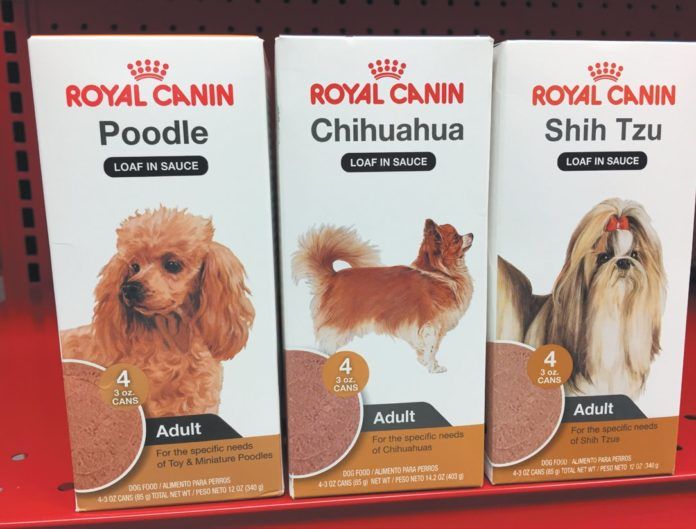You’ve seen the ads on TV — dog foods meant specifically for your dog’s breed to provide the best nutritional advantage. But are these benefits for real? Can you really improve your dog’s health by feeding her kibble marketed just for, say, poodles or Labrador retrievers, or German shepherds? It’s a question worth answering, since breed-specific foods don’t come cheap. A 17-pound bag of dry food for Labs that we found online costs $45.00.
Evidence is slim
Two companies that make breed-specific dog foods are Royal Canin and Eukanuba, both owned by Mars, Inc. They are well regarded manufacturers with good reputations. Still, there are no legal standards for creating a food meant to shore up the health of this or that breed. The foods all meet nutrient profiles for healthy pets set by the Association of American Feed Control Officials (AAFCO), but after that, it’s the company’s discretion for the “breed specific” part, explains board-certified veterinary nutritionist Cailin Heinze, VMD. There are no rules for how to manipulate the diets.
Granted, German shepherds are known to have gastrointestinal issues, so perhaps the ingredients are more easily digestible than ingredients found in some other foods, or the food might have types and amounts of fiber aimed at promoting gastrointestinal health. And miniature schnauzers sometimes have trouble with fat, so perhaps the kibble for them has less fat than food for other breeds.
But, says Dr. Heinze, “One company’s Labrador retriever diet could be the same as another company’s German shepherd diet. There aren’t any guidelines, and there is not a lot of research to back up which breeds will do better on which diets.”
There’s certainly no published scientific data in peer-reviewed journals that your Lab will be healthier if you feed her a Lab diet as opposed to a general diet. “Companies are just formulating foods based on knowledge of the breeds rather than testing foods in different dogs to see if those eating diets for specific breeds live longer or healthier lives than dogs fed foods not intended for particular breeds,” Dr. Heinze says. “You have to take the company’s word. There’s no proof currently. And it can be difficult to detect differences in overall health between diets that are nutritionally balanced but have some more subtle modifications.”
The kibble’s shape does count
There is one area where evidence for certain breed-specific foods is supported by clinical investigation: the shape and size of the kibble, which could potentially have an impact on a dog’s health. For example, Dr. Heinze says, “One company has done a lot of studies looking at how dogs of various breeds pick up their food. They feed pets of different breeds on glass, with cameras underneath to capture their eating styles.”
That’s why, for instance, the company’s kibble for bulldogs is shaped like big squiggles. “Based on their research, it makes it easier for a dog’s flat face to pick it up,” Dr. Heinze says. It’s also why the brand’s kibble for Labrador retrievers “is huge and has a hole in the middle.” The company measured the time it takes Labs to eat variously shaped kibble and found that it takes quite a bit longer to eat food configured that way, maybe two minutes instead of one. That could conceivably help keep a dog from developing health issues associated with eating too quickly, like swallowing excessive air or not registering how many calories are being consumed.”
Whether these diets lead to long-term health improvements is unclear, but at least within the company, they have yielded intriguing results.






I’m now feeding my Cavalier King Charles Spaniels the early heart healthy Royal Canin kibble – on the recommendation of the dogs Cardiologist. The older one has advanced mitral valve heart problem, and apparently there is less sodium in this kibble. It is definitely more expensive. Previously I was feeding them Wellness small breed senior. Now I’m wondering if I am wasting my money on the more expensive heart healthy food. They are food driven and love any kibble and of course there is no way of telling whether this is slowing down the heart disease or not. Any thoughts on this?
Keep an eye out for BHA and BHT in ingredients. These are proven cancer causing preservatives in mice, rats and hampsters! Many dog foods and treats have removed theses but many still have not. You can also find these preservatives in OTC meds and people foods. Be careful.